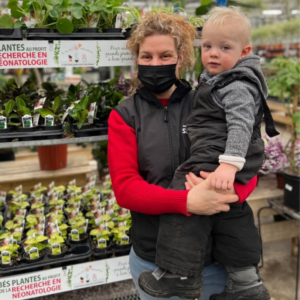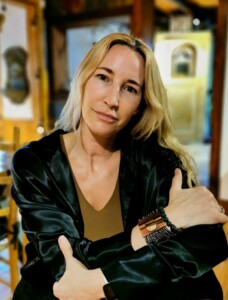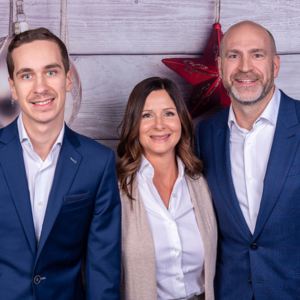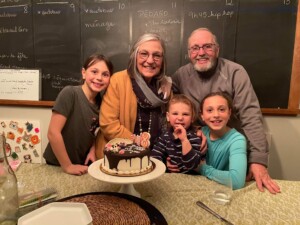Every year, thousands of children are diagnosed with a serious illness.
And not all of them can be cured… yet.
Every donation helps us support even more researchers and advance their pediatric research projects. By helping us to eliminate incurable childhood diseases, thousands of donors like you help us to accelerate cures for kids.
Read the inspiring stories of donors, children and researchers who are determined to cure every sick child, every last one.

On May 12, 2021, the lives of Élise and Antoine were turned upside down. On that day, when she was just 22 weeks pregnant, Élise’s water broke. The couple, both doctors, knew exactly what this meant: at this stage of pregnancy, the chances of survival are slim. Very slim. In the ambulance on the way to the Royal Victoria Hospital, a single thought haunted them: “It’s over.” But they didn’t yet know Florence’s strength.

A light in the darkness
On arrival at the Montreal Children’s Hospital, an ultrasound revealed that Florence’s heart was still beating. She was moving. Against all odds, a determined medical team succeeded in extending the pregnancy by three precious days.
Three more days in this womb that had become a refuge.
Florence was born at 23 weeks, by Caesarean section. She weighed barely 650 grams.
A fighter from the first breath
Florence was intubated from birth. Her lungs were immature, unable to function on their own. Just a few days old, she removed her tube three times. This gesture, both dangerous and upsetting, revealed a warrior’s temperament.
“We didn’t know that such a small baby could already have so much character,” recalls Élise.
Every day was a victory, but also a trial. Florence developed retinopathy of prematurity, a serious condition that threatens vision. She received eye injections to prevent blindness.
Then a catheter-related infection caused her to stop breathing. Her little heart was put to the test. It was at this point that a cardiac complication led to a difficult but obvious choice for the parents: to participate in a clinical study.
Research as a lifeline
The study, led by Dr Gabriel Altit – a paediatric cardiology researcher supported by the Foundation – aimed to gain a better understanding of the side effects of steroids administered to very premature babies, particularly on the heart.
“For us, it was an obvious choice. Research had already saved Florence’s life once before. Now it was our turn to contribute,” confides Antoine.
The protocol involved repeated cardiac ultrasound scans to detect the subtle effects of medication, which are often underestimated. Thanks to their participation, Florence received even more targeted care. And other children will benefit from these discoveries in the future.
Today: a little girl full of life
Today, Florence is 4 years old.
She runs, climbs, devours her meals with appetite. She tries to keep up with her big sister in all her adventures. She continues to undergo physiotherapy, occupational therapy and ophthalmology, notably for retinopathy of prematurity, but she’s doing well. Very well indeed.
She goes to daycare, laughs out loud, loves her doggies and asks a thousand questions. Every day, she’s living proof that science can transform an uncertain future into a life full of promise.
Immense gratitude
Florence would not be here today without the advances in research, without the exceptional care provided by the Children’s team, without the donations that enable researchers to go ever further.
“Thanks to the Foundation and the generosity of donors, children like Florence can not only survive, but thrive. Thank you for believing, too, in these fragile but infinitely strong little hearts,” concludes Florence’s father, Antoine.
Florence
A 650-gram miracle

Mélanie Grégoire, mother of young Laurent, tells us the story of this courageous little boy: “Thirty weeks, that’s where science is at.” That sentence, spoken by Dr. Etienne Fortin-Pellerin, confirmed that there was hope, and I clung to it for the 60 days my son was in intensive care.
 “My son Laurent was born prematurely. It was a painful experience. First there was the shock of having to give birth under general anesthesia, and then the agonizing questions that followed. Will my child live? If so, in what condition? An uncontrollable feeling of guilt came over me. I had to wait a whole day to see my darling baby! He was intubated all over and I couldn’t hold him. It was devastating. That’s when Dr. Fortin-Pellerin told me that, thanks to advances in research, he could “repair” my son’s lungs. If you only knew the relief and gratitude I felt! It’s clear to me now: it’s thanks to people like you, who donate to research, that my Laurent was able to pull through. Today, he is a beautiful, energetic baby! I am grateful to all of the Foundation’s donors.”
“My son Laurent was born prematurely. It was a painful experience. First there was the shock of having to give birth under general anesthesia, and then the agonizing questions that followed. Will my child live? If so, in what condition? An uncontrollable feeling of guilt came over me. I had to wait a whole day to see my darling baby! He was intubated all over and I couldn’t hold him. It was devastating. That’s when Dr. Fortin-Pellerin told me that, thanks to advances in research, he could “repair” my son’s lungs. If you only knew the relief and gratitude I felt! It’s clear to me now: it’s thanks to people like you, who donate to research, that my Laurent was able to pull through. Today, he is a beautiful, energetic baby! I am grateful to all of the Foundation’s donors.”
Laurent
The courageous

In 2001, I lived through one of the most difficult life experiences imaginable. I gave birth to a baby girl born with an anomaly related to venous return. The problem was too small to be detected on an ultrasound.
My little Valérie lived for only 25 hours, and during that period underwent three operations before she died. I cannot even begin to describe the pain of the year that followed.

As a result of this ordeal, I experienced a spiritual awakening. I began to be more conscious of the present moment, the ‘here and now’. I became very in tune with my life and was always on the lookout for those simple pieces of happiness that gave me the strength and the desire to look towards the future. I can now say that I am stronger from this extraordinarily painful experience. Today, I want to share this heartfelt message with you:
Even if it feels like our lives are going a thousand miles an hour, it is essential to realize how lucky we are to be on our beautiful planet, and to enjoy every moment—life is the greatest gift that is offered to us.
Sick children and their parents need our support, and it only takes a few minutes to make a real difference in their lives. It’s easy to make an impact.
“For the past 20 years, I have been a monthly donor to the Pediatric Research Foundation. You can do the same!”
The amount isn’t important – it’s the commitment and the consistency that make all the difference.
Small amounts accumulate gradually over time and can save lives!
Be a shining light for the Pediatric Research Foundation. Hundreds of families will thank you.
Caroline Cloutier

Mathis has fragile X syndrome—a rare genetic defect that causes intellectual disability. Here is the testimonial of the parents of Mathis, who is being followed by Dr. François Corbin and Professor Jean-François Lepage, whose research on this syndrome is financially supported by the Pediatric Research Foundation.

“When the doctors gave us Mathis’s diagnosis, they said that there was a high risk associated with placing him in a care facility adapted to his condition because of the aggressive behaviours that the disease can trigger. That day, I couldn’t go home right away. We were in shock. But we got back on our feet, we took a positive approach and gave Mathis as many family experiences as possible (we have four children). As Mathis grew up, he became Sir Smile, a walking bundle of joy! We know that many families would like to see Dr. Corbin’s clinical trial result in a miracle. For us, the miracle is our son. That is why we are participating in the research work conducted by Dr. Corbin and Professor Lepage.”
Mathis
Sir Smiley

Joanne Beaupré Roberge has been a monthly donor to the Foundation of Pediatric Research for 15 years. It was through her employer that she had her first contact with the cause. :
“He was involved in the Telethon of Stars and that made me want to get involved. I have been a monthly donor ever since. For me, it’s an easy way to support a cause that I believe in and that is close to my heart,” she explains.

This mother of three children and grandmother of three grandchildren (fourth one coming soon!), recognizes her luck when it comes to having a family in perfect health.
“It’s easy to give when life is good! I even increased my donation this year, because I know that the monthly donation contributes concretely to meeting research needs, so that all children can have the same chance as mine and live their lives in perfect health.”
Joanne Beaupré-Roberge





